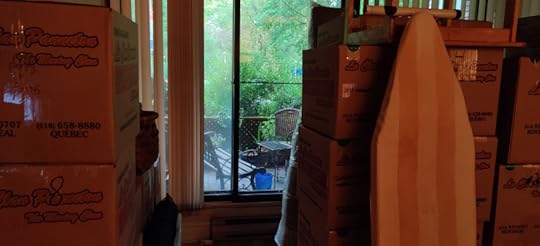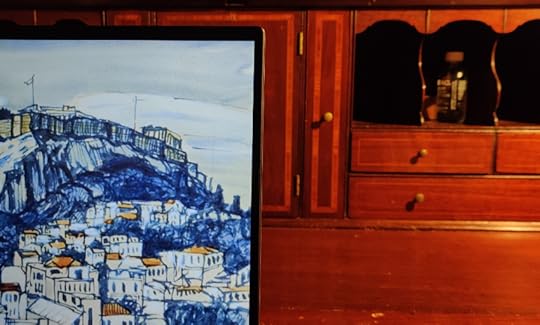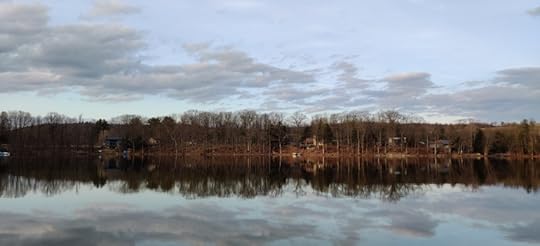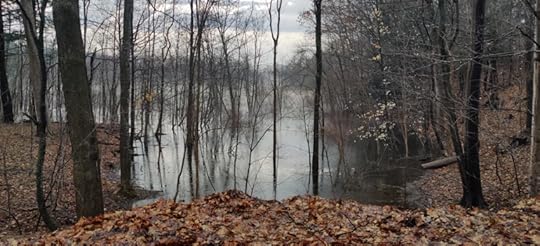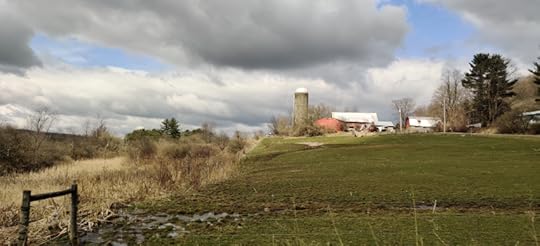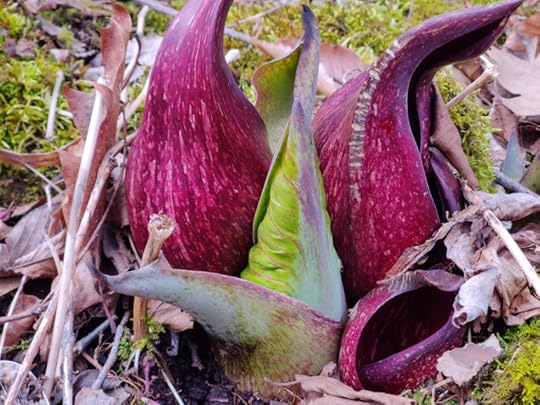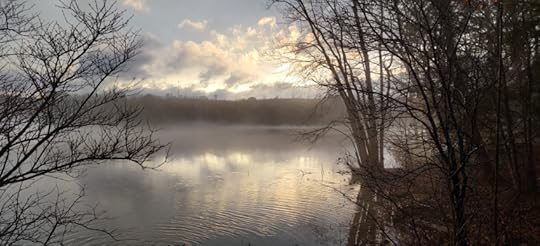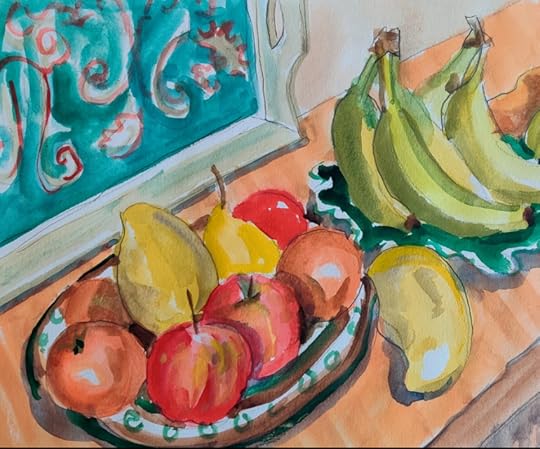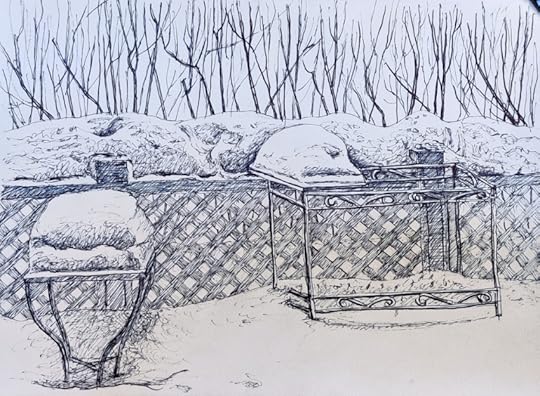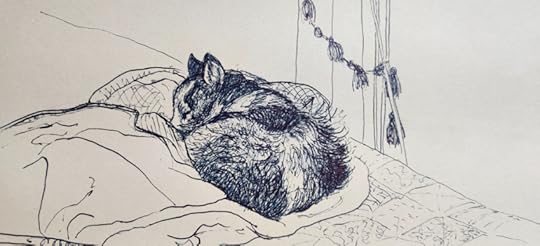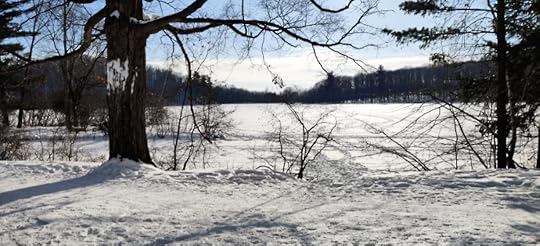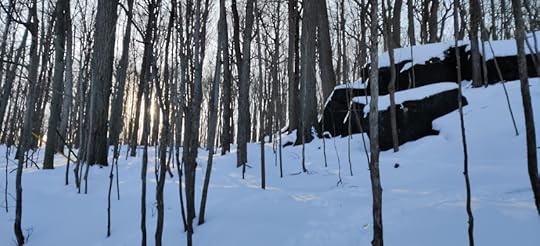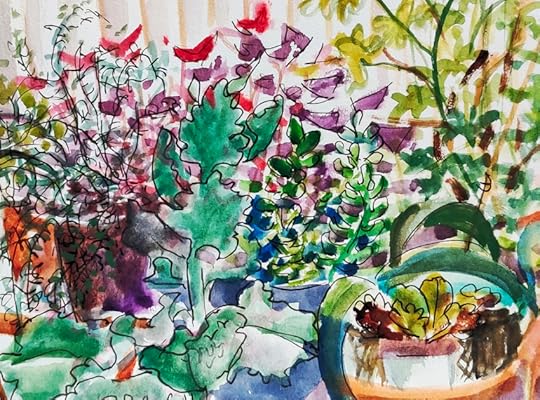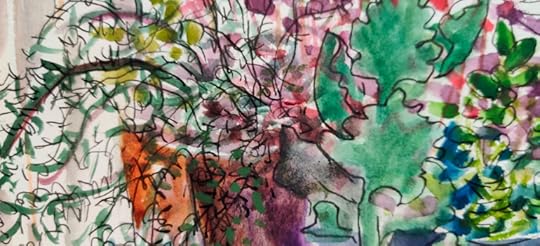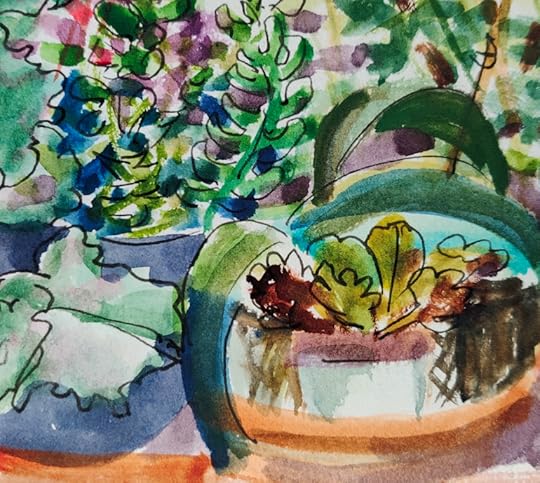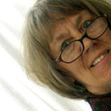Elizabeth Adams's Blog, page 13
June 16, 2022
Déménagement
J. and M. on our terrace in Montreal's Plateau Mont-Royal, in 2012.
We're moving. That little statement could mean all sorts of things. But the French word déménagement is so specific, and in this case it means we're moving house. To faire le menage is to do the housework; the word ménagement, without the "dé", means "care and attention". My dictionary tells me that to speak sans ménagement is "bluntly", to be asked to leave sans ménagement mean "forcibly evicted." I like the way the word déménagement reflects the accumulation of care and attention put into one's home over the years, that one doesn't simply pack objects and oneself and move, shift locations, but that when we leave our home, hopefully for another, we also wrap up our memories and our time spent in a place that was not simply an address, but a home.
Tonight is the last we'll spend in the condominium where we've lived ever since coming to Montreal. It is one apartment of ten in our building, which, as co-propriétaires, we all own and care for together. I've been one of the people responsible for the gardens, while J. has had a much larger role as treasurer and a member of the CA, or conseil d'administration, the executive committee that's in charge of maintenance, repairs, hiring and managing helpers, and assuring the smooth running of the building. It's been a great place to live for the past 18 years (how can it possibly be that long?) and we're sorry to be leaving this neighborhood, the park, and especially our neighbors who've become good friends. However, the pandemic showed us that this small apartment simply doesn't work for us as a place to live and work as well. When we were going to our studio every day, it was fine, but during COVID, and since cutting back on our professional work, we haven't been using the studio very much, while, at the same time, the rent there has been going up astronomically under new owners. We looked and looked in this part of the city but couldn't find any good or affordable solution for a larger, brighter, recently-built space that would serve as both living and work space, and also be an appropriate place for us as we grow older, with room for help if we ever need it, proximity to our medical providers, easy access to the international food shopping we enjoy, and some additional amenities. Neither of us wants to be responsible for an aging building at the same time as we, ourselves, age.
Tonight.
To our surprise, we found a recently-developed area close to some of the food shopping -- Middle Eastern, Asian, Greek -- that takes us across the city every couple of weeks. At first we couldn't imagine living there -- so little green space, none of the genteel French atmosphere of the area where we live now, but rather a mix of large, professionally-managed residential high-rises and industrial areas and gradually-developing retail infrastructure -- but when we actually visited the buildings and saw some apartments, which offered so much more for the price than in the more traditional neighborhoods of the city, we began to consider it. In the end, we bought a condominium on the 11th floor of a 12-storey building built in 2018. We've both always had it in the backs of our minds that we might like to live in a modern, light-filled urban space, high up -- I think this realization came after some of the apartments we stayed in in Mexico City and Athens. I'm still kind of shocked that we're actually doing it, but the papers have been signed, we have the keys, the boxes are packed and the bed-frame taken apart -- and tomorrow at 8 the movers arrive. We will close our studio when the lease runs out in the fall, or perhaps before then, since we've packed up or sold quite a lot of what was there. We've gotten rid of a lot of possessions, including books and clothes, in this second major downsizing of our adult lives, and that feels great. In our new space we'll each have a workroom/studio of our own, and I look forward to this very much, and to whatever comes out of the solitude and new inspiration of the big skies we'll see every day.
At the same time as we've been preparing for the move, I've been deeply concerned about my father, and, as I've written here, we made three lengthy trips to central New York to be with him under the rapidly-changing circumstances of his health; he was first with us, then in assisted-living, then hospitalized with pneumonia, then in a grim rehabilitation/nursing facility from which I've been desperately trying to extricate him. This week our application was accepted, and he has moved into one of the excellent New York State Veterans' Homes, where they are glad to begin to know him and care for him as a veteran of WWII. In spite of our personal changes and exciting new beginnings in Montreal, part of me is there, back at the lake, wanting to spend time with my father during this uncertain final part of his life -- so we will find ways to work that out.
May 23, 2022
Desk, Domain
I'm sitting at my grandmother's antique slant-top desk. It's a gorgeous piece of cabinetry, larger than my own desk, with detailed inlays and dovetail joinery, drawers for pens and supplies, vertical pull-out holders for writing papers, and a locking cabinet in the center. I feel a bit dwarfed, a sensation which isn’t helped by the fact that all the chairs in the house are too low for it.
When we lived in the big house in town, this desk was always in the front room downstairs, its rich brown wood contrasting with the Victorian floral wallpaper behind it. The desk was directly across from the upholstered chair where my grandmother read and knitted and embroidered, drank martinis in the evening, and played canasta. Its right side touched the wooden frame of the wide doorway between the living room and the dining room -- and on that frame were scratched the heights of my cousins and myself each year as we grew.
My grandmother used the desk when she sat down to do her daily correspondence, and I think also to pay bills -- but I never remember my grandfather sitting at it. The top held various curios, most of which have now disappeared, but were fascinating to me as a child: a heavy, dark purple glass bear whose head came off to reveal a container inside; two Chinese brass vases and an ivory elephant: gifts from faraway from my mother's high school sweetheart who was beloved by the family and had gone down with his Navy ship in the Pacific in WWII; a little oval wooden box filled with tiny South American figures -- no more than half an inch high -- dressed in colorful costumes made of bits of fabric and wrapped, colored thread; and many other things that I might be allowed to play with and dream about on a special day. It was clear, though, that I was never to open the drawers or look at any letters or writing: this was her private domain.
After my grandparents died, in their nineties, my parents built a large living room addition on their own house here at the lake, and moved some of the furniture they had inherited. The desk was placed against the back wall of the new living room, fitting perfectly into the center of the white-painted paneling my father had carefully constructed. The four big drawers below held maps and stamp collections, papers and scrapbooks, but if my mother or father ever used the desk itself, I didn’t know about it; they did their paperwork on a modern desk downstairs, or on the round oak table where we ate, near the kitchen. For them I think it was mostly a decorative, formal showpiece that offered convenient, out-of-sight storage, and they kept the slant-top closed. Three Wedgwood vases stood on the top, along with a pair of candlesticks, and above them hung an airbrush painting of mine from the 1980s that is a closeup of a purple pansy, rather Georgia O’Keefe-esque. In the thirty years since they built the addition, this arrangement never changed.
During our current stay at the lake house, since we are now alone here and likely to remain so, I’ve taken a few tentative steps toward moving a few things around: a decision that feels both illicit and liberating. We had already moved a few pieces of furniture to my father’s room in his assisted-living home, so that was the beginning, and my father’s presence during that process seemed to give permission. The other night I removed several other things from the bedroom, cleared off the top of the dresser and replaced figurines and photographs with a single modern ceramic vase I’d given my mother years ago. I think the urge to do this came from the radical cleaning of our apartment we’d done before putting it on the market, but it had barely occurred to me before that I could do any such thing in this overcrowded house. I continued by clearing the counter at the top of the stairs; I stripped the kitchen countertops bare and polished the white formica before replacing only the barest essentials and stowing everything else in cupboards; we bought a mop and scrubbed the tile floor. Outdoors, I picked up a decade’s worth of fallen branches, raked leaves, pruned overgrown bushes, swept the railroad-tie steps going down to the lake, got out the outdoor furniture and put it in a different spot, and with my husband’s help, dragged a bench down to my favorite place just above the shoreline. All of this took place at a slow rate of one project every day or two.
Tonight, tired and worried about my father, I came into this room, which we seldom use, and stretched out on the couch. I did my Duolingo lesson and the Times mini crossword and Spelling Bee on the free phone app which always kicks me out after a certain point. Then I pulled a knitted afghan over myself, thinking I might take a little nap, accompanied by the contemplative robin that’s nesting in the light fixture just outside the terrace door...but my eyes kept opening and gazing across the room at the desk. After a few minutes I had gotten up, opened the top, and set to work sorting the incongruous things I found inside: a strange, heavy antique brass writing stand with two glass inkwells; bottles of disk cleaner for LP records; three old letter openers, an intricate silver one that looked Turkish and quite lethal, and two that are clearly African; a collection of DVDs; a Silva compass with a leather case; a collection of old brass drafting equipment and a velvet snap-top jewelry box filled with old Schaeffer and Parker graphite leads; a handwritten wiring map for my father’s cabinet of turntables, tape decks and DVD players. As I did this, slowly, the thought began to form: could I actually use this desk? Could I write something here? When all the surfaces and pigeonholes were empty, I removed the vases and candlesticks to the piano, and wiped the wood with a barely-damp cloth. My sketchbook and watercolor palette went on the left side, some pens on the right. Then I ascertained that, yes, there was an outlet on the wall in fairly close proximity, set my laptop, mousepad and mouse in the center of the open desk, noticing for the first time the reassuring dents and scratches in the old mahogany -- and turned the computer on.
It felt like... a moment. Like introducing your close but perhaps slightly questionable young friend to a beloved elderly grandparent. But the hinges didn’t give way, the marquetry didn’t fall out: in fact, the wood felt warm and beckoning and somehow personal, and I began immediately to write.
April 26, 2022
Changes
Dear Readers,
This is probably the longest I've ever gone between two posts: a lot has been going on. Thank you for checking back here.
On the morning of March 23, my father's partner Barbara suffered a massive stroke and was taken to hospital. We left Montreal almost immediately to be with him, and ended up staying for the next three weeks as we tried to help him through the death of his partner a week later (she never regained consciousness), moved him out of the home they had shared for 12 years into our own family home at the lake, and then explored options for him to stay there with help, or to move into assisted living: the latter was the choice he finally made. This would have been a huge upheaval of grief, loss, and change for anyone, and he is 97, living in a rural area that doesn't have robust, reliable social services or any transportation to speak of: almost everyone relies on their own car, even at an advanced age. The options are very limited.
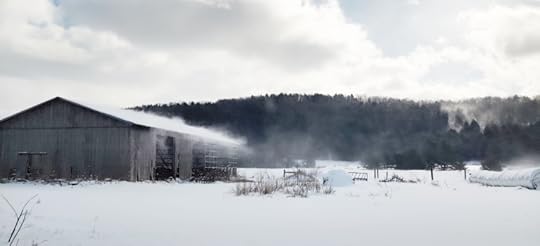
Snow squalls on the way to Cooperstown.
After a lifetime of athleticism and self-motivated attention to physical fitness, including a new hip and two knee replacements, he's had increasing trouble with arthritis and declining mobility and balance over the past two years. Although we're all hopeful that physical therapy may help him regain some strength and greater comfort, it became clear that he couldn't stay in his own house safely, so he chose a facility in the small city where he and Barbara had lived, where he will be close to his friends, his partner's family who have been so kind to him, and where life will be as familiar as possible. My father is a courageous and stoic person, and although these events were wrenching and extremely difficult, I'm proud of how the three of us navigated them together, and glad I had the privilege of spending so much time with him. It wasn't all care-giving, either; we played chess and cards, he taught me tricks for solving Sudokus, and I learned a lot about antique clock repair. More significantly, the three of us had long conversations over each meal about everything from life and death, to how my father began building this house, back in the 1950s. I think he learned quite a bit more about the two of us as well.
The swamp on the back side of the lake was full of spring peepers.
We've now returned home to Montreal and are preparing for a major life-change ourselves: a move to a larger condominium that we had bought shortly before all of this happened. Our own apartment will go on the market soon, and we'll move in mid-June to our new home, in a different part of the city, and close our studio at the end of October. We plan to go back to central New York to see my father, and attend Barbara's memorial service, in the middle of May. She was a kind, generous, sociable, cheerful and optimistic person, devoted to her extended family; she and my father played golf and bridge together, did some traveling, enjoyed going out to eat, and had an active social life. The two of them were excellent companions and a lovely couple: I'm so grateful for all the good years they spent together and the joy they brought to each other's lives, so unusual in their length of years and the good health they both managed to enjoy. We will miss her.
While we were staying at the lake, another close friend of our family also died. Ray lived a few houses away, and was in his late 80s; the friendships between our families span three generations. We were able to see his children; we all tried to help each other and talked about the strange feeling of watching our parents' generation, who have been such strong and constant figures of our childhoods and the long subsequent years, now pass the torch to us when we're all getting on in age ourselves.
The late spring weather was pretty wretched -- grey and rainy, with days of windy snow squalls -- but the lake was a reassuring presence. Every morning when I got up, I'd spend some time looking out at the water and its changing moods, and every evening when it was possible, my husband and I took a walk around the lake at sunset, looking out at the fields as the farmers began to plow, watching the migrating geese and a group of mergansers that had stopped at the lake for a while, and, to our great excitement, observing a bald eagle nest with vigilant adult birds, at the top of a tall pine tree.
Skunk cabbage.
We arrived when the days were still snowy, and by the time we left, a loud chorus of spring peepers could be heard each evening, skunk cabbages had unfurled in the swamp, and I spotted the first mayflowers in bloom at the foot of an old beech tree near the house. During our drives in the countryside, through the Chenango and Unadilla Valleys to Cooperstown and Binghamton, and up over the Madison County hills to Cazenovia and Syracuse, I was comforted and enchanted once again by the beauty of the pastoral landscape that's been imprinted on me since childhood. It's no wonder, I thought to myself, that I became a landscape painter, with deep emotional ties to the land, the light, the plants and trees, and the form of the hills and valleys that were shaped by glaciers that deposited the round cobblestones -- still seen in old barn foundations -- on top of sedimentary rock layers rich with marine fossils. All these daily sights, combined with a long personal history, became my daily consolations.
March 20, 2022
19 Years
Today marks nineteen years of continuous blogging here, and I find myself at a loss for words. Partly because it doesn't even make sense to me that I've done this for that long; partly because Cassandra -- like nearly everyone else -- failed to predict the tragedy unfolding in the Ukraine with its huge ramifications for the world's political future; and partly because -- also like nearly everyone else -- I am weary, and unable to package things up into any sort of comforting explanation or pretty picture, either for myself, or for public consumption.
But that's all right. There are times in all of our lives when we simply have to let go of and be still, finding consolation and strength in the simplest things: a raindrop hanging on a branch; a cat playing with a ribbon; the clouds traversing the sky; damp earth emerging from the snow.
March 9, 2022
Day by Day
Snow on the terrace. Fountain pen in sketchbook, 9" x 6". March 4, 2022.
A friend posted a cartoon the other day - you may have seen it - that was a variation of the little fish being eaten by successively bigger fishes. In this one, the earth was the little fish, the next bigger one, with its mouth open ready to grab the earth, was COVID, which in turn was about to be devoured by THE WAR, and then by the biggest one of all, CLIMATE CHANGE. It would be amusing if it weren't such a perfect illustration of all of our nightmares.
Coping, I freely admit, has been harder than ever as we watch the unfolding of a brutal war on our screens, and wonder, for the first time in many many years, about the possibility of a much larger conflict, and even nuclear war. I grew up during the Cold War, when the "Iron Curtain" was a reality in Eastern Europe, when Germany, and Berlin itself, were divided and people who tried to cross borders were shot, when the idea of speaking to a Russian or meeting a Russian in real life was something of fantasy. Even arts or sports exchanges were extremely rare. When the term "glasnost" became associated with Mikhail Gorbachev in the mid-1980s, I had already lived more than 30 years with an entirely different idea of what the Soviet Union represented than a 35-year-old person must have now. At that time, we were involved in a Vermont initiative called "Bridges for Peace" that helped facilitate some of the first citizen exchanges between the US and the USSR, and while we didn't travel to the Soviet Union ourselves, I remember the preparatory meetings, and the first gathering where we welcomed a group of heavily-chaperoned Soviet citizens, heard their impressions, and had a chance to ask questions. One person remarked on his astonishment at the size of our grocery stores and the amount and variety of food available. A few years later, there were visits by Russian musicians and choirs; each time, it seemed, they had a little more freedom, and acted more relaxed, so that eventually we could simply be people together sharing meals and an art form that we all loved.
The Iron Curtain fell, the Soviet Union broke apart, but the West has changed too. We take so much about our present lives for granted; we are so complacent.
Porcelain doll with broken hand. Fountain pen in sketchbook, 9" x 6". March 7, 2022.
I've felt heartbroken by current events, as well as frightened, and not just for the Ukrainian people. Even if it is contained, the ramifications of this war will be felt by all of us, and who knows where it will end: are we, in fact, going back to the Cold War years? Will all the diplomatic, economic, and collaborative progress of the last forty years be lost? What about nuclear containment? What kind of weapons will be unleashed? Will nuclear facilities be protected, or will there be another horrific event like Chernobyl? Will the conflict spread to Eastern and then Western Europe? It's unthinkable. The scale of the risk is so much greater and more complex than the well-meant but naive yellow-and-blue flags and sunflowers cropping up all over social media. If you send aid, please do it through established and reputable channels where it has a chance of getting through.
It is a very sober time: a time when I feel called to silent reflection, learning, and meditating on history and on the present, as we still deal with Covid and climate change and all the other pressing problems of our personal and shared lives that seem dwarfed by each day;s news. I haven't been able to write much, but I've tried to draw. I hope you are finding ways to cope, and would be glad to have you share your thoughts.
Manon, sleeping. Fountain pen in sketchbook, 9" x 6". February 24, 2022.
March 2, 2022
Ash Wednesday, in this Time of Perpetual Lent
Lent begins today: the Christian season of repentance, reflection, and renunciation. I went to the noontime services at the cathedral, and when the priest came down the aisle with the bowl of ashes, I rose -- but only reluctantly -- to receive them. It probably would have been more honest to stay in my seat.
After two years of a pandemic that has taken so many to an early grave, and convinced most of us of our mortality if we didn't accept it before, I felt resistance to this reminder, symbolized by the ashes and the accompanying words "Remember you are dust and to dust you shall return." In a time of aggression and horrific war, I do not need a reminder of the human lust for power and too many rulers' disregard for life. When we are told that we come from the dust of the earth, and will return to it, I already know all too well the intense pressure the earth is under because of human behavior, and what the future is likely to hold because of climate change.
Furthermore, all of these things are related. Like many of you, I've been reflecting on the failures of institutions and governments, as well as the behaviors of individuals, for two years now. I've felt helpless, and also tried to see where I could be of help, extending myself to others, and feeling immensely grateful for the people who have extended themselves to me. Many of us have tried to do this, and a lot of those efforts have been successful: building and nurturing supportive relationships and groups who have met and sustained each other in creative new ways.
What we do not need right now is guilt, and unfortunately Lent tends to go either in that direction, or toward the superficial, as if giving up chocolate is really going to melt human hardness of heart. Sincere reflection on how we can be more courageous, more loving, more open to each other, and more aware of the interconnection of all living things is always needed and welcome. But as I looked around the sanctuary today, the people I recognized in the pews were people who already do this, and try to live their lives responsibly and lovingly. These are not people who think vaccines should be withheld from poor countries, or people who don't recycle and drive massive vehicles, or who support white supremacy, or think that despots who want to overthrow legitimate governments are admirable.
And yet these are precisely the problems we are facing, along with many others. What would make me feel some movement this Lent, instead of turning to individuals and saying "This is on you, admit your faults, repent," would be to hear our institutions and governments say, "We have been reflecting on how we have failed in our tasks and our mission to you. We have been self-serving, short-sighted and hypocritical, and we want to repent, to reform, to change, to do better."
You laugh, and you're right to laugh: it will be a cold day in hell before that happens. Our apparent powerlessness in the face of so much that we know is wrong has been one of the most sobering lessons of this time in history. Look at what is happening in Ukraine at this very moment.
And yet. Change seldom comes from above, unless we are fortunate enough to nurture and support truly visionary leaders. Most of the time, we must try to work outward and upward, starting with ourselves, then moving to small groups of like-minded people with passion for justice and change, and then banding together into new institutions, or working to shape and hold accountable those that already exist. Unless we do that, the status quo will prevail, because institutions and governments are not nimble and flexible, but heavy, ponderous, and stuck in their ways, and so they tend to focus on self-preservation rather than change.
If churches clearly stood for justice and "the dignity of every human being", as we proclaim in our baptismal covenant, and were seen to be working openly toward those goals, I think we would actually attract more people. In the case of my own church, we have had active ministries for the homeless, for social justice and the environment, for anti-racism, for the LGBTQ+ community and for young people. We have taken part in the Truth and Reconciliation process with Indigenous Canadians about the abuses they suffered, which, to this former American, was a remarkable example of humility, listening, admission of wrongs committed, and desire to change -- but we're not very good at letting the outside world know about any of this, and our inability to meet in person until recently hasn't helped.
In the public sphere, democracy is threatened everywhere, even here in Canada; all we have to do is look to our southern neighbor to see what could happen. The rest of the world, which once saw America as a bastion of democratic values, sees the hypocrisy, as do those Americans who have been marginalized: the pandemic has shown just how unequal that society is, and how dangerous a hyper-emphasis on personal freedom can be, over the shared good of all. Rather than truth-telling, I'm afraid what we see is perpetual myth-making about American exceptionalism.
But, in the end, change still has to start with me, as with each of us, and it needs to come from positive energy, love for others, and passion for shared goals, rather than guilt. My practice this Lent will be to try to meditate every morning, to discourage feelings of helplessness and despair, and reflect instead on what I am being called to do next -- which may simply be a continuation of what I am doing now; I don't know. I will also bring some of these thoughts to a small group of which I am a part as we reflect together. I think this process of discernment is perhaps the real purpose of Lent, as we seek positive movement in ourselves while the earth moves toward spring.
February 19, 2022
A Brief Comment on the Truck Convoy
First of all, I would like my US and international readers to know that the news about the truck convoy protest, as reported in Canada, is quite different than what I have heard is being reported through some other media, notably Fox News.
Second, a large majority of Canadians are appalled by the protesters and the support they have received from outside Canada, particularly the US far right. Many Canadians are baffled as to why it has taken so long for the police to clear the blockades.
The right to protest is enshrined in Canada, and especially in Quebec, where I live. In Montreal, there are protests and demonstrations all the time, and the city and police know how to handle them fairly peacefully. I'm sure that the initial hope was that the truckers would leave peacefully on their own. However, we should all realize that if this were a protest by Indigenous or other minorities/people of color who blocked city streets, transportation routes, or the supply chain for goods, action against them -- including arrests -- would have been much faster. And it is clearly true that, as in the January 6 2021 Capitol insurrection in D.C., some members of the police and military sympathize and identify with these mostly-white, mostly working-class, mostly-male protesters, some of whom were armed and ready for violent confrontation.
We must not close our eyes to this glaring example of inequality and preferential treatment, which is now typical of most nations in the West. And as Canadians, it's crucial that we see it and speak up swiftly against it, as well as condemning hate speech, far-right ideology, and the influence of foreign money in our domestic affairs.
February 18, 2022
Winter Night
Night settles over the park, shadows have rolled themselves up;
the sky, a flat translucence behind cut-out branches
casts a blue light on the snow.
In the hedge, little lights glow like forgotten fireflies,
the sparrow-flock has flown, a leaping squirrel
leaves sculpted waves of white along the rail.
Now, only furtive shapes move on the white path:
runner, skier, the eager dog
pulling his master further into the black trees.
February 1, 2022
The Consolation of Snow
My friend Jon Appleton died on Sunday evening at the age of 83.
Yesterday afternoon, a brilliant blue day, we drove to Mont St-Bruno and took a long walk around the Lac Seigneurial; it was the right thing to do. I may write more about this eventually, but for now, I'll let Tomas Tranströmer speak for me. Jon loved Sweden and poetry, and although he also spent a lot of time in warm places, such as California, Hawaii, Tonga, southern France, I always think of him in the north: Vermont, Sweden, Moscow. One of my most vivid memories of him is from a visit to us in Montreal some years ago, when there was an absolutely huge blizzard, one of the heaviest and stormiest I can remember. Being Vermonters at heart, none of us wanted to stay in, so we bundled up and decided to go out and see if we could find a restaurant that was still open. I can still see Jon, wearing his Russian fur hat, cavorting in the snow-filled street and laughing with delight: "This is aMAZing!"
He was a person who lived life as fully as possible, and who for many of his students and friends was -- as this poem says - "a half-open door leading to a room for everyone." Like Tranströmer, Jon suffered a stroke toward the end of his life. It affected his speech, which he gradually recovered, but he wasn't able to continue composing music. During our last visit to him, he showed us the art studio in his retirement complex, where he said he was enjoying doing some painting. And even in the last two weeks he was writing with great pleasure about a new recording being done by Yoshiko Kline of some of his piano works, and working with an editor on the final draft of his autobiography. The creative spark never went out, and the best way I can remember and honor him, and what he gave me, is to try to do the same.
Two poems by Tomas Tranströmer
The Half-Finished Heaven
Despondency breaks off its course.
Anguish breaks off its course.
The vulture breaks off its flight.
The eager light streams out,
even the ghosts take a draught.
And our paintings see daylight,
our red beasts of the ice-age studios.
Everything begins to look around.
We walk in the sun in hundreds.
Each man is a half-open door
leading to a room for everyone.
The endless ground under us.
Snow is Falling
The funerals keep coming
more and more of them
like the traffic signs
as we approach a city.
Thousands of people gazing
in the land of long shadows.
A bridge builds itself
slowly
straight out in space.
January 19, 2022
Making Sense Out of Chaos
Our houseplants all go outside on the terrace in the summer, and in the winter they're on tables near the front windows, under plant lights. Unlike the summer arrangement, when each one is in its ideal growing spot, shown off to best advantage, and augmented with flowering annuals, the winter situation is crowded. Every plant gets plenty of water and food and light, but there's no way I can give each one exactly what it needs. Nor is the arrangement nearly as attractive; we're talking about survival in limited space.
Because of that, I've felt a lot less compelled to draw or paint the plants indoors. Each is competing with the next one, so you can't even see the beautiful leaves of the begonias, or the lacy foliage of the scented geraniums, or the sculptural succulents. They're all crammed together in a cluttered busy-ness that rivals any English cottage garden for visual competition. Nevertheless, the other night, I just felt like something was prompting me to have a go -- maybe it was the felt-like foliage of that ridiculously enormous Kalanchoe beharensis "Fang", in the center.
I propped my watercolor box on the chair near my knee, and started painting directly, laying down one color after another, as quickly as I could, to try to capture the energy and chaotic over-crowding of the scene before me. The terracotta pots and wooden table gave the picture a little bit of unification and structure, but basically there wasn't any overall composition to be had. Nor were there strong shapes - just the big fleshy leaves of "Fang". The geranium in the background, the butterfly-like triangles of the oxalis, the succulents, and the busy needles of the rosemary plant were all similar enough in size to compete with each other, but not stand out. I just kept at it, adding brushstrokes, dashes, lines, dots. Once all the color was on the page, I went back with a pen and sketched in some loose shapes and lines, and finally added the vertical window blinds in the background with watercolor.
The only solution, it had seemed, was just to go for the visual clutter. Feeling dubious, I posted the image on Instagram, with the slightly apologetic comment, "Once again, fascinated by the busyness of plants." A little while later, my friend Michael Szpaskowski and I had this exchange:
Michael: "And that that ‘busyness’ becomes the compositional imperative here is great. Both truthful (I’m not saying that artistic truth is always of this nature of course) and very beautiful."
Beth: "It is both the compositional imperative and its greatest obstacle. The urge is to bludgeon the busyness into some sort of submissive order, but that wouldn't be true. So then what do you do?...I like aspects of it, but it still doesn't entirely work for me. Tonight I was thinking maybe if I tried it from a high angle, the ovals of the tops of the pots would give a compositional rhythm that might unify the picture a little more. But not sure if I have the energy for another try!"
Michael: "Oh it is precisely its ‘awkwardness’ that I find so winning!"
This was a very helpful exchange, because when I studied the image again with his words in mind, I realized that it was actually OK not to have a strong and obvious composition or structure; instead there's color and life dancing all over the image, and the loose horizontal and vertical lines do just enough work to hold everything within the frame.
Chaos is all around us these days. Here in Quebec, we're in a terrible situation, at or near the peak of the current Omicron wave, and the hospitals are overwhelmed. Yesterday, a government report was obtained and published by RadioCanada, detailing plans to stop trying to isolate COVID patients in hospitals, allow workers to return to work even if they're still ill, accelerate discharges, decrease the level of care if necessary in order to provide at least some care to more people, and even ask patients' families to provide basic care (feeding, cleaning, bed changing, etc) for them in the hospital to free up the staff to do clinical work. It's shocking that it's come to that; the whole system is in danger of breaking down -- and that's in a province with 90% of the people vaccinated with at least two doses. There simply isn't sufficient infrastructure to deal with this many patients when we don't have enough staffed acute care beds, and so many healthcare workers are either out sick themselves, or have quit over the past two years. And the government has also made a series of disastrous decisions, such as delaying the booster campaign until Omicron was already upon us. I'm angry about this, frustrated, and worried.
And of course, it's not just COVID that gives us all a sense of uncontrolled chaos: the news from the U.S. is terrible, Europe is in disarray, there may be war in Ukraine, the climate crisis envelops all of us, lots of our friends and family are sick, many of us have had health or psychological problems because of the unremitting stress, or delayed and limited access to care, we can't see the people we want to, or go where we'd like, and the future continues to feel entirely uncertain.
Is it possible, as in the picture, to simply embrace some of that craziness and uncertainty, instead of -- as I wrote to Michael, "trying to bludgeon the busyness into some sort of submissive order"? Can we sit with it, and even find some beauty and truth there? That's a hard task, but it seems to me that it's more realistic -- and potentially more helpful -- than fighting and resisting what is.
Since Christmas, I've been starting each day with half an hour of yoga practice. Doing this regularly is new to me. I can feel my body responding slowly to the daily movements: already I'm a little bit stronger, more flexible, with better balance. But I think I've been helped equally by the mental discipline of a daily commitment, conscious breathing, and then the attentive relaxation at the end, followed by some time on my mat and cushion in meditation - even if it's just five minutes of awareness and gratitude for being here, right now. It makes a difference. I still get upset, but I can see that, like the gradual body changes, there's a gradual emotional shift toward greater equanimity in spite of what's going on around me.
There are other ways to encourage a shift: we all need to find what works for ourselves. The only point I'm trying to make is that when we can't change the big, chaotic, confusing, intractable external things, sometimes there is potential movement inside ourselves -- if we're willing to change old habits and ideas, and experiment a little.


